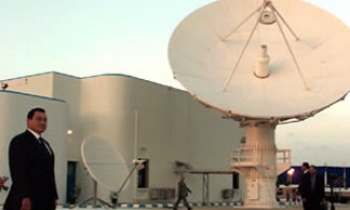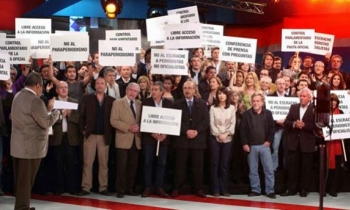When a newspaper cartoon in Denmark can provoke riots from Jakarta to Gaza, and causes Europeans, regardless of their passport, to fear for their security, it is time to sit up and take notice. Unfortunately, few people seem to realise how symbolically important this case is.
Firstly, we should re-think our understanding of the word "globalisation". The word is employed differently according to whom one talks to. In popular parlance it appears in combination with the notion that "they" are stealing jobs from "us". Globalisation is about the economy, free trade and foreigners buying our firms. Absent is the dimension of globalisation which makes it a new phenomenon: the instant transmission of information around the globe. The problem is that the same information e.g. a cartoon picture of the Prophet can be viewed as "tame" in one society, but as a "violent defamation" in another.
Secondly, the nature of the "threat" has changed - radically. I recall, as a young army officer in the mid-1980s looking at a military training film called "The Threat". It was full of Soviet T-72 tanks and BMPs (armoured personnel carriers) conducting manoeuvres. Unfortunately, our security forces are still equipped with tanks, fighter-bombers and submarines to repel that old threat. But are they any good to save our citizens in Gaza, Saudi Arabia, and Iran from abduction? And what can we do to stop the risk of violence spreading over into our own big cities with their often oppressed feeling - Muslim communities? Are you really planning to torpedo that with your billion-Euro submarine, admiral?
Thirdly, there is the impact of global information on "free speech". Until now we in the "democratic West" - have seen it as a boon. As people in the DDR learnt that their fellow countrymen could leave by driving through Hungary, revolution broke out. As the spread of information grows, we hear of Orange, Rose and Tulip revolutions. But the result can be the opposite too. In the wake of Jyllands-Posten we may resort to self-censorship for fear of provoking "somebody somewhere on the planet". Or worse still, Yahoo will be even keener to hand over the information on one of its users so as the Chinese government can put him in prison for ten years Is globalisation perhaps the era of "free (self-)censorship" instead?
Finally, if ever it were not clear before, like it or hate it, we all are seen by the rest of the world as "Europe" or even more approximately as "The West". Whereas the Fatwah for "Satanic Verses" was declared against the author alone, the on-line caused chaos will not differentiate between peoples and governments. Fine, be Swiss and neutral if you want to. But do not expect to escape being lynched by waiving your passport at the on-coming rioters in the bazaar. This determines that we absolutely have to act as the European Union. On the other hand, it also means that we have to accept being lumped in with the USA. After all, for the Arab street, the US is just doing now, what we used to do to the rest of the world before the European Civil War of 1939-1945
This flash in the pan of reaction to some poorly thought-out cartoons is just a pre-cursor of much to come. But that need not be a clash of civilisations, where Europeans lack the security structures and retreat into self censorship, fearing that they are reviled elsewhere. To avoid such a scenario requires that we look at our "footprint" on the globe. That what we publish, consume and do has repercussions elsewhere. Moreover, it means fundamental Security Sector Reform. It also implies active encouragement of certain forms of information spreading to those parts of the globe that are not open but mostly about what is happening inside of those countries. And finally, we had better start getting our act together as the EU, if we want to have any hope of influencing the US juggernaut, let alone the rest of the world!









